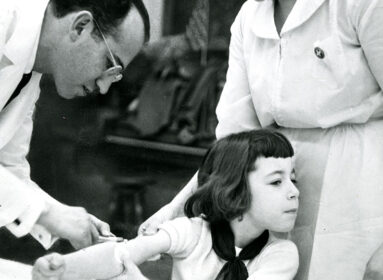
By Curt Schleier
(JTA) – When the rock musical “Spring Awakening” premiered on Broadway, it was a critical darling and financial success. It won almost every major award possible, including eight Tonys, four Drama Desk Awards and even a Grammy. So perhaps it’s not so surprising that it’s been revived on Broadway.
More startling, though, is that the current production of “Spring Awakening” features a cast of deaf actors signing their lines — and songs. One of the show’s most high-profile stars, Marlee Matlin, concedes that people might consider the idea — deaf actors performing a musical — a bit strange.
“You’re talking about something that doesn’t happen every day,” she told JTA through her interpreter, Jack Jason, as she was en route to her temporary Manhattan digs rented for the duration of the play, which runs through January. “People who haven’t seen the show have to wonder, how is this going to work?”
The answer: very well.
Each deaf actor is accompanied by a hearing one, who sings or speaks what is being signed. It takes audience members just a few minutes to become oriented, in part because the show, a production of the Deaf West Theater, is so creatively staged.
Set in Germany in the late 19th century, the “awakening” in “Spring Awakening” is a sexual one. A group of adolescents must deal with feelings they don’t understand and their repressed parents do not explain. The musical has a rousing score by Steven Sater and Duncan Sheik that particularly comes to life when the young actors sing as an ensemble. When that happens, the deaf actors become like dancers; through their fast-paced use of American Sign Language, their hands combine the precision of the Rockettes with the artistry of ballerinas.
Although, like Matlin, a few of the deaf actors have some hearing, “It is not about hearing the music,” she says. In fact, several of the actors who have minimal hearing decided not to wear hearing aids during the performance.
“They’re just great actors who incorporate the rhythm into their acting,” says Matlin, who is making her Broadway debut. Matlin, along with actress Camryn Manheim — who, like Matlin, is Jewish — play several adult female roles in the play. While Matlin herself doesn’t sing, she says the “most difficult part was learning my lines in conjunction with the music.”
Matlin, 50, was born in a Chicago suburb, the only deaf person in her family. She started to lose her hearing at 18 months for reasons unknown.
Her family belonged to B’nai Shalom, the Jewish Temple for the Deaf, in nearby Skokie, which was run by a hearing rabbi whose goal was to bring the deaf and hearing Jewish communities together.
“It started out with deaf and and their hearing family members going to temple together, but it attracted a great number of hearing people” as well, she says.
For Matlin, it provided not only a link to other deaf people, but to her religion. “It gave me a community to belong to. We’d go to temple Friday nights and I’d learn about my religion and learn about my faith,” she says. “I always looked forward to the community. I got bat mitzvahed there.”
Matlin signed the English parts of the service but learned her Torah portion phonetically and read it in Hebrew. She wasn’t the only one who did that, and she concedes some of what the deaf children read was unintelligible to members of the congregation. “But it didn’t matter,” she says, “because they were reading from the Torah and that’s what it was all about.”
The experience at the temple encouraged her in other ways.
“It gave me the drive, it gave me the foundation to believe in myself, despite what other people say,” Matlin says.
Her family was also a pillar of strength. At seven, when she said she wanted to be an actress, they enrolled her in a program at the Chicago-based International Center on Deafness and the Arts. There Matlin immediately pursued and landed the role of Dorothy in “The Wizard of Oz.”
Another Jewish actor, Henry Winkler, saw one of her performances and went backstage afterward. “I told him I wanted to be in Hollywood. He said, ‘believe in yourself,’” she recalls. “He encouraged me over the years, and I took his advice to heart.”
The two became so close that Matlin stayed with the Winklers for two years when she went out to Hollywood in her late teens. His mentorship helped her land the role of Sarah Norman in “Children of a Lesser God.” Her performance as a custodian at a school for the deaf who becomes romantically involved with a hearing teacher (played by William Hurt) garnered her, at age 21, both an Academy Award and Golden Globe Award for best actress. She has also starred in several TV series and has also guest starred in everything from “Seinfeld” to “Law & Order: SVU,” the latter earning her a Primetime Emmy nomination.
Matlin’s personal life hit rough water early on. In her 2009 autobiography, I’ll Scream Later, she writes of her tumultuous off-screen romantic relationship with Hurt, which was punctuated by episodes of domestic violence. She also went through a period of drug abuse and went to the Betty Ford clinic for treatment.
In 1993, she married Los Angeles-area police officer Kevin Grandalski, in a ceremony that was held at Winkler’s home. They have four children aged 12 to 19.
As to her Broadway debut, Matlin is loving it.
“Everything that’s happening is so great; the many messages, the communications from fans,” she says. “It’s a wonderful experience.”








 Southern New England Jewish Ledger
Southern New England Jewish Ledger













